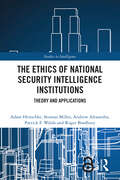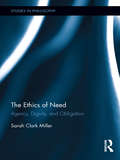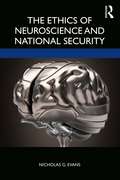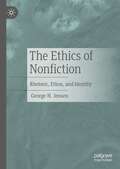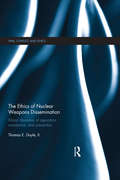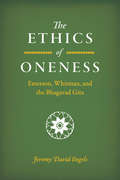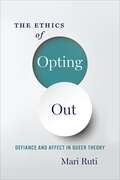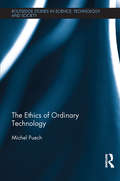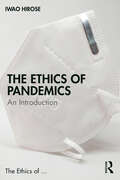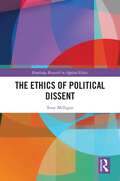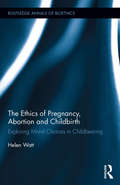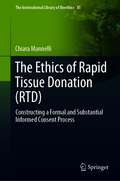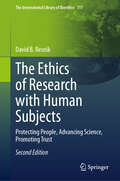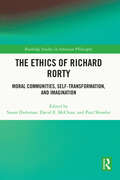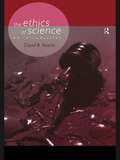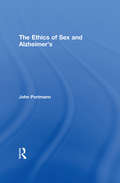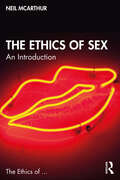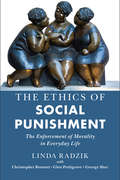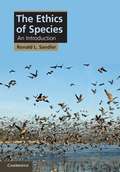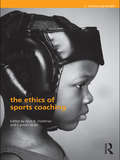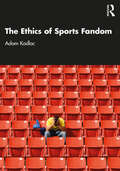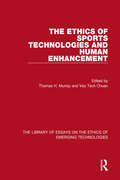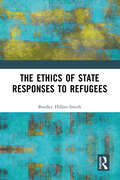- Table View
- List View
The Ethics of National Security Intelligence Institutions: Theory and Applications (Studies in Intelligence)
by Seumas Miller Andrew Alexandra Adam Henschke Patrick F. Walsh Roger BradburyThis book explores the ethics of national security intelligence institutions operating in contemporary liberal democracies.Intelligence collection by agencies such as the CIA, MI6, and Mossad involves practices that are apparently inconsistent with the principles of ordinary morality – practices such as lying, spying, manipulation, and covert action. However, in the defence of national security, such practices may not only be morally permissible, but may also under some circumstances be morally obligatory. One approach to the ethics of national security intelligence activity has been to draw from the just war tradition (so-called ‘just intelligence theory’). This book identifies significant limitations of this approach and offers a new, institutionally based, teleological normative framework. In doing so, it revises some familiar principles designed for application to kinetic wars, such as necessity and proportionality, and invokes some additional ones, such as reciprocity and trust. It goes on to explore the applications of this framework and a revised set of principles for national security intelligence institutions and practices in contemporary and emerging political and technological settings.This book will be of much interest to students of intelligence studies, ethics, security studies and International Relations.
The Ethics of Need: Agency, Dignity, and Obligation
by Sarah Clark MillerThe Ethics of Need: Agency, Dignity, and Obligation argues for the philosophical importance of the notion of need and for an ethical framework through which we can determine which needs have moral significance. In the volume, Sarah Clark Miller synthesizes insights from Kantian and feminist care ethics to establish that our mutual and inevitable interdependence gives rise to a duty to care for the needs of others. Further, she argues that we are obligated not merely to meet others’ needs but to do so in a manner that expresses "dignifying care," a concept that captures how human interactions can grant or deny equal moral standing and inclusion in a moral community. She illuminates these theoretical developments by examining two cases where urgent needs require a caring and dignifying response: the needs of the elderly and the needs of global strangers. Those working in the areas of feminist theory, women’s studies, aging studies, bioethics, and global studies should find this volume of interest.
The Ethics of Neuroscience and National Security
by Nicholas G. EvansNew advances in neuroscience promise innovations in national security, especially in the areas of law enforcement, intelligence collection, and armed conflict. But ethical questions emerge about how we can, and should, use these innovations. This book draws on the open literature to map the development of neuroscience, particularly through funding by the Defense Advanced Research Projects Agency, in certain areas like behavior prediction, behavior modification, and neuroenhancement, and its use in the creation of novel weapons. It shows how advances in neuroscience and new technologies raise ethical issues that challenge the norms of law enforcement, intelligence collection, and armed conflict, broadly grouped under the term "national security." Increasing technological sophistication without attention to ethics, this book argues, risks creating conditions for the development of "dual-use" technologies that may be prone to misuse, are grounded in an incomplete understanding of the brain, or are based on a limited view of the political contexts in which these technologies arise. A concluding section looks at policy and regulatory options that might promote the benefits of emerging neuroscience, while mitigating attendant risks. Key Features: First broad survey of the ethics of neuroscience as it applies to national security Innovative ethical analysis over a range of cross-cutting technologies including behavior prediction and modification tools, human enhancement, and novel lethal and nonlethal weapons Ethical analysis covering all stages from the development, testing, and use (or misuse) of these technologies; and decisions from the individual scientist to the nation state Strong policy focus at multiple levels, from self-governance to international regulation Combination of philosophical analysis with grounded, practical recommendations
The Ethics of Nonfiction: Rhetoric, Ethos, and Identity
by George H. JensenThis book explores issues of identity, ethics and epistemology that arise around the writing and reception of creative nonfiction. It examines a range of different nonfiction forms – including the personal essay and memoir – and ethical questions that arise in relation to them, such as truth claims, the confessional mode, counter-narratives. Drawing on the ideas of Bakhtin, Nietzsche and Foucault; examples from creative non-fiction writers such as Strayed and Knausgaard; and the founding principles of the originators of the genre, Seneca, Augustine and Montaigne, George Jensen argues that a limited conception of nonfiction leads to a limited view of its ethics. Writing about the truth in an authentic way is more important than ever before – and essential to this is the creation of the ethical subject.
The Ethics of Nuclear Weapons Dissemination: Moral Dilemmas of Aspiration, Avoidance and Prevention (War, Conflict and Ethics)
by Thomas E. Doyle, IIThis book examines the moral dilemmas of nuclear dissemination, and the justifications of both nuclear pursuit and avoidance by contemporary states. Applying Constructivist methodologies and moral theory, the author analyses a core set of moral dilemmas that ensnare decision-makers amongst state and non-state nuclear aspirants, as well as amongst states committed to preventing horizontal proliferation. The book shows that the character, structure and implications of these dilemmas have not yet been adequately understood or appreciated, and that such an understanding is necessary for an effective set of nonproliferation policies. Furthermore, it shows that the dilemmas’ force and political policy import are evident in the 'discourses' that diverse actors undertake to defend their nuclear choices, and how the dilemmas of nuclear aspirants are implicated in those of nuclear preventers. The author advocates a number of policy recommendations that reinforce some already made by scholars and experts but, more importantly, others that advise significantly different courses of action. The book reveals how the moral dilemmas of nuclear aspiration, avoidance, and prevention constitute the security dilemmas and paradoxes that comprise much of the 21st century security environment. This book will be of much interest to students of nuclear proliferation, international relations, ethics, and international security studies.
The Ethics of Oneness: Emerson, Whitman, and the Bhagavad Gita
by Jeremy David EngelsWe live in an era defined by a sense of separation, even in the midst of networked connectivity. As cultural climates sour and divisive political structures spread, we are left wondering about our ties to each other. Consequently, there is no better time than now to reconsider ideas of unity. In The Ethics of Oneness, Jeremy David Engels reads the Bhagavad Gita alongside the works of American thinkers Ralph Waldo Emerson and Walt Whitman. Drawing on this rich combination of traditions, Engels presents the notion that individuals are fundamentally interconnected in their shared divinity. In other words, everything is one. If the lessons of oneness are taken to heart, particularly as they were expressed and celebrated by Whitman, and the ethical challenges of oneness considered seriously, Engels thinks it is possible to counter the pervasive and problematic American ideals of hierarchy, exclusion, violence, and domination.
The Ethics of Opting Out: Queer Theory's Defiant Subjects
by Mari RutiIn The Ethics of Opting Out, Mari Ruti provides an accessible yet theoretically rigorous account of the ideological divisions that have animated queer theory during the last decade, paying particular attention to the field's rejection of dominant neoliberal narratives of success, cheerfulness, and self-actualization. More specifically, she focuses on queer negativity in the work of Lee Edelman, Jack Halberstam, and Lynne Huffer, and on the rhetoric of bad feelings found in the work of Sara Ahmed, Lauren Berlant, David Eng, Heather Love, and José Muñoz. Ruti highlights the ways in which queer theory's desire to opt out of normative society rewrites ethical theory and practice in genuinely innovative ways at the same time as she resists turning antinormativity into a new norm. This wide-ranging and thoughtful book maps the parameters of contemporary queer theory in order to rethink the foundational assumptions of the field.
The Ethics of Ordinary Technology (Routledge Studies in Science, Technology and Society)
by Michel PuechTechnology is even more than our world, our form of life, our civilization. Technology interacts with the world to change it. Philosophers need to seriously address the fluidity of a smartphone interface, the efficiency of a Dyson vacuum cleaner, or the familiar noise of an antique vacuum cleaner. Beyond their phenomenological description, the emotional experience acquires moral significance and in some cases even supplies ethical resources for the self. If we leave this dimension of modern experience unaddressed, we may miss something of value in contemporary life. Combining European humanism, Anglophone pragmatism, and Asian traditions, Michel Puech pleads for an "ethical turn" in the way we understand and address technological issues in modern day society. Puech argues that the question of "power" is what needs to be reconsidered today. In doing so, he provides a three-tier distinction of power: power to modify the outer world (our first-intention method in any case: technology); power over other humans (our enduring obsession: politics and domination); power over oneself (ethics and wisdom).
The Ethics of Pandemics: An Introduction (The Ethics of ...)
by Iwao HiroseThe recent COVID-19 pandemic has brought a broad range of ethical problems to the forefront, raising fundamental questions about the role of government in response to such outbreaks, the scarcity and allocation of health care resources, the unequal distribution of health risks and economic impacts, and the extent to which individual freedom can be restricted. In this clear introduction to the topic Iwao Hirose explores these ethical questions and analyzes the central issues in the ethics of pandemic response and preparedness such as: The general nature of pandemics and the ethics of preparedness Ethical questions about general goals of pandemic response and preparedness The distribution of scarce resources, for example, ventilators, hospital beds, antiviral drugs, and vaccines Restrictions on individual freedom Ethical questions in the wake of pandemics, including contact tracing, vaccine passports, and socioeconomic inequalities. With the use of real-life examples and a clear philosophical approach, The Ethics of Pandemics is a much-needed introduction to some of the most important ethical issues surrounding pandemics. It is essential reading for students of ethics, bioethics, and political philosophy and will also be of interest to those working in related areas such as public policy, public health, health law, nursing, and life sciences.
The Ethics of Political Dissent (Routledge Research in Applied Ethics)
by Tony MilliganA broadly liberal politics requires political compassion, not simply in the sense of compassion for the victims of injustice but also for opponents confronted through political protest and (more broadly) dissent. There are times when, out of a sense of compassion, a just cause should not be pressed. There are times when we need to accommodate the dreadfulness of loss for opponents, even when the cause for which they fight is unjust. We may also have to come to terms with the irreversibility of historic injustice and reconcile. Political compassion of this sort carries risks. Pushed too far, it may weaken our commitment to justice through too great a sympathy for those on the other side. It would be convenient if such compassion could be constrained by a clear set of political principles. But principles run the quite different risk of promoting an ‘ossified dissent,’ unable to respond to change. In this book, Tony Milligan argues that principles are only a limited guide to dissent in unique, contingent circumstances. They will not tell us how to deal with the truly difficult cases such as the following: Should the Lakota celebrate Thanksgiving? When is the crossing of a picket line justified? What kind of toleration must animal rights advocates cultivate to make progress within a broadly liberal political domain? And how should we respond to the entangling of aspiration towards social justice with anger and prejudice (such as the ‘anti-Zionist’ discourse)? We may be tempted to answer these questions by presupposing that alignment (the business of choosing sides) is ultimately more important than compassion, but sometimes political compassion trumps alignment. Sometimes, being on the right side is not the most important thing.
The Ethics of Political Dissent (Routledge Research in Applied Ethics)
by Tony MilliganA broadly liberal politics requires political compassion, not simply in the sense of compassion for the victims of injustice but also for opponents confronted through political protest and (more broadly) dissent. There are times when, out of a sense of compassion, a just cause should not be pressed.There are times when we need to accommodate the dreadfulness of loss for opponents, even when the cause for which they fight is unjust. We may also have to come to terms with the irreversibility of historic injustice and reconcile. Political compassion of this sort carries risks. Pushed too far, it may weaken our commitment to justice through too great a sympathy for those on the other side. It would be convenient if such compassion could be constrained by a clear set of political principles. But principles run the quite different risk of promoting an ‘ossified dissent,’ unable to respond to change.In this book, Tony Milligan argues that principles are only a limited guide to dissent in unique, contingent circumstances. They will not tell us how to deal with the truly difficult cases such as the following: Should the Lakota celebrate Thanksgiving? When is the crossing of a picket line justified? What kind of toleration must animal rights advocates cultivate to make progress within a broadly liberal political domain? And how should we respond to the entangling of aspiration towards social justice with anger and prejudice (such as the ‘anti-Zionist’ discourse)? We may be tempted to answer these questions by presupposing that alignment (the business of choosing sides) is ultimately more important than compassion, but sometimes political compassion trumps alignment. Sometimes, being on the right side is not the most important thing.
The Ethics of Pregnancy, Abortion and Childbirth: Exploring Moral Choices in Childbearing (Routledge Annals of Bioethics)
by Helen WattThe Ethics of Pregnancy, Abortion and Childbirth addresses the unique moral questions raised by pregnancy and its intimate bodily nature. From assisted reproduction to abortion and ‘vital conflict’ resolution to more everyday concerns of the pregnant woman, this book argues for pregnancy as a close human relationship with the woman as guardian or custodian. Four approaches to pregnancy are explored: ‘uni-personal’, ‘neighborly’, ‘maternal’ and ‘spousal’. The author challenges not only the view that there is only one moral subject to consider in pregnancy, but also the idea that the location of the fetus lacks all inherent, unique significance. It is argued that the pregnant woman is not a mere ‘neighbor’ or helpful stranger to the fetus but is rather already in a real familial relationship bringing real familial rights and obligations. If the status of the fetus is conclusive for at least some moral questions raised by pregnancy, so too are facts about its bodily relationship with, and presence in, the woman who supports it. This lucid, accessible and original book explores fundamental ethical issues in a rich and often neglected area of philosophy in ways of interest also to those from other disciplines.
The Ethics of Preventive War
by Deen K. ChatterjeeIn this book, eleven leading theorists debate the normative challenges of preventive war through the lens of important public and political issues of war and peace in the twenty-first century. Their discussion covers complex and topical subjects including terrorism, the 'Bush doctrine' and the invasion of Iraq, Iran's nuclear capabilities, superpower unilateralism and international war tribunals. They examine the moral conundrum of preventive intervention and emphasize the need for a stronger and more effective international legal and political order and a corresponding re-evaluation of the normative status of international law. Together their essays form a challenging and timely volume that will be of interest to scholars in ethics and political philosophy, political theory, international relations, international law and peace studies and to general readers interested in the broader issues of peace and justice in the new world order.
The Ethics of Rapid Tissue Donation: Constructing a Formal and Substantial Informed Consent Process (The International Library of Bioethics #85)
by Chiara MannelliThis book offers a reflection on the central role that the ethics of informed consent plays in Rapid Tissue Donation (RTD). RTD is an advanced oncology procedure that involves the procurement, for research purposes, of “fresh” tissues within two to six hours of a cancer patient’s death. Since RTD involves the retrieval of tissues after death, and since the collected tissues are of great importance for medical research, the need for any form of informed consent to regulate this procedure has been questioned. This book argues for the necessity of informed consent to govern RTD, and it provides the reader with a bespoke informed consent process applicable to cancer patients. The analysis unfolds at the intersection between applied ethics, public health ethics, and clinical ethics, and it is informed by philosophical theories of informed consent and by the social implications of individual choices. By viewing medical issues relating to informed consent in oncology from an ethical perspective, the book combines philosophical analysis with discussion of concrete cancer-related issues. As a result, the book is suitable for readers interested in ethical reasoning as well as for those with a medical background. It contributes to contemporary research by offering an original analysis that relies on a rigorous philosophical approach to address innovative issues at the cutting edge of medical research and policy making.
The Ethics of Research with Human Subjects: Protecting People, Advancing Science, Promoting Trust (The International Library of Bioethics #111)
by David B. ResnikIn The Ethics of Research with Human Subjects, David B. Resnik, PhD/JD, develops and defends an approach to thinking about ethical and policy dilemmas in research with human subjects based on the notion of trust. The book explains why trust is important not only between investigators and research subjects but also between and among other stakeholders involved in the research enterprise, including research staff, sponsors, institutions, communities, oversight committees, government agencies, and the public. Dr. Resnik argues that trust should be viewed as a distinct ethical principle for research with human subjects that complements other principles, such as respect for human dignity, beneficence, non-maleficence, and justice. The book applies the principle of trust to numerous issues, including informed consent, confidentiality/privacy, risk minimization, risk/benefit assessment, payments for participation, protection of vulnerable subjects, experimental design, research integrity, and research oversight. The book also includes discussions of the history of research involving human subjects, moral theories and principles, contemporary cases, and proposed regulatory reforms. This second edition of The Ethics of Research with Human Subjects expands upon and clarifies arguments and ideas discussed in the first edition and includes new material on emerging issues in human research ethics, including community-based research, citizen science research, challenge studies (including COVID-19 experiments), public health research, genomics research, social and behavioral research, xenotransplantation experiments, alternative study designs, and research with people with compromised decisional capacity, employees, and students. The book is of interest to undergraduate and graduate students who are studying ethical and policy issues related to research with human subjects, as well as scientists and scholars who are interested learning more about the issues and thinking about what it means to promote integrity and trust in research with human subjects.
The Ethics of Richard Rorty: Moral Communities, Self-Transformation, and Imagination (Routledge Studies in American Philosophy)
by Susan Dieleman David E. McClean Paul ShowlerThis book contains diverse and critical reflections on Richard Rorty’s contributions to ethics, an aspect of his thought that has been relatively neglected. Together, they demonstrate that Rorty offers a compelling and coherent ethical vision. The book's chapters, grouped thematically, explore Rorty’s emphasis on the importance of moral imagination, social relations, language, and literature as instrumental for ethical self-transformation as well as for strengthening what Rorty called "social hope," which entails constant work toward a more democratic, inclusive, and cosmopolitan society and world. Several contributors address the ethical implications of Rorty’s commitment to a vision of political liberalism without philosophical foundations. Others offer critical examinations of Rorty’s claim that our private or individual projects of self-creation can or should be held apart from our public goals of ameliorating social conditions and reducing cruelty and suffering. Some contributors explore hurdles that impede the practical applications of certain of Rorty's ideas. The Ethics of Richard Rorty will appeal to scholars and advanced students interested in American philosophy and ethics.
The Ethics of Science: An Introduction
by David B. ResnikEthics of Science is a comprehensive and student-friendly introduction to the study of ethics in science and scientific research. The book covers: * Science and Ethics * Ethical Theory and Applications * Science as a Profession * Standards of Ethical Conduct in Science * Objectivity in Research * Ethical Issues in the Laboratory * The Scientist in Society * Toward a More Ethical Science * Actual case studies include: Baltimore Affair * cold fusion * Milikan's oil drop experiments * human and animal cloning * Cold War experiments * Strategic Defence Initiative * the Challenger accident * Tobacco Research.
The Ethics of Sex and Alzheimer's
by John PortmannA growing epidemic, Alzheimer’s punishes not only its victims but also those married to them. This book analyzes how Alzheimer’s is quietly transforming the way we think about love today. Without meaning to become rebels, many people who find themselves "married to Alzheimer’s" deflate the predominant notion of a conventional marriage. By falling in love again before their ill spouse dies, those married to Alzheimer’s come into conflict with central values of Western civilization – personal, sexual, familial, religious, and political. Those who wait sadly for a spouse’s death must sometimes wonder if the show of fidelity is necessary and whom it helps. Most books on Alzheimer’s focus on those who have it, as opposed to those who care for someone with it. This book offers a powerful and searching meditation on the extent to which someone married to Alzheimer’s should be expected to suffer loneliness. The diagnosis of dementia should not amount to a prohibition of sexual activity for both spouses. Portmann encourages readers to risk honesty in assessing the moral dilemma, using high-profile cases such as Nancy Reagan and Justice Sandra Day O'Connor to illustrate the enormity of the problem. Ideal for classes considering the ethics of aging and sexuality.
The Ethics of Sex: An Introduction (The Ethics of ...)
by Neil McArthurThe Ethics of Sex: An Introduction systematically and comprehensively examines the ethical issues surrounding the concept of sex. It addresses important questions such as: How can we approach questions of sexual ethics in a philosophical way? Must we give affirmative consent to all sexual activity, and what would be the impact of implementing an affirmative consent standard into law? Can our dating preferences ever be considered a form of discrimination? Is BDSM sex compatible with feminism? Should we promote monogamy as the best way to live? Is it harmful to have a relationship with a robot? Should sex work be decriminalized? Is there a right to sex? Including discussion questions and suggestions for further reading at the end of each chapter The Ethics of Sex is the perfect philosophical introduction to the perennially topical issue, and ideal reading for students taking courses within the fields of applied ethics, sociology, law, religion and politics.
The Ethics of Social Punishment: The Enforcement of Morality in Everyday Life
by George Sher Christopher Bennett Linda Radzik Glen PettigroveHow do we punish others socially, and should we do so? In her 2018 Descartes Lectures for Tilburg University, Linda Radzik explores the informal methods ordinary people use to enforce moral norms, such as telling people off, boycotting businesses, and publicly shaming wrongdoers on social media. Over three lectures, Radzik develops an account of what social punishment is, why it is sometimes permissible, and when it must be withheld. She argues that the proper aim of social punishment is to put moral pressure on wrongdoers to make amends. Yet the permissibility of applying such pressure turns on the tension between individual desert and social good, as well as the possession of an authority to punish. Responses from Christopher Bennett, George Sher and Glen Pettigrove challenge Radzik's account of social punishment while also offering alternative perspectives on the possible meanings of our responses to wrongdoing. Radzik replies in the closing essay.
The Ethics of Species
by Ronald L. SandlerWe are causing species to go extinct at extraordinary rates, altering existing species in unprecedented ways and creating entirely new species. More than ever before, we require an ethic of species to guide our interactions with them. In this book, Ronald L. Sandler examines the value of species and the ethical significance of species boundaries and discusses what these mean for species preservation in the light of global climate change, species engineering and human enhancement. He argues that species possess several varieties of value, but they are not sacred. It is sometimes permissible to alter species, let them go extinct (even when we are a cause of the extinction) and invent new ones. Philosophically rigorous, accessible and illustrated with examples drawn from contemporary science, this book will be of interest to students of philosophy, bioethics, environmental ethics and conservation biology.
The Ethics of Sports Coaching (Ethics and Sport)
by Alun R. HardmanIs the role of the sports coach simply to improve sporting performance? What are the key ethical issues in sports coaching practice? Despite the increasing sophistication of our understanding of the player-sport-coach relationship, the dominant perspective of the sports coach is still an instrumental one, focused almost exclusively on performance, achievement and competitive success. In this ground-breaking new book, leading sport scholars challenge that view, arguing that the coaching process is an inherently moral one with an inescapably ethical dimension, involving intense relationships between players and coaches. The Ethics of Sports Coaching critically examines this moral aspect, develops a powerful idea of what sports coaching ought to be, and argues strongly that coaches must be aware of the ethical implications of their acts. The book is structured around four central themes: the nature of coaching, the character of the coach, coaching specific populations and specific coaching contexts. It explores in detail many of the key ethical issues in contemporary sports coaching, including: coaching special populations the ethics of talent identification understanding the limits of performance enhancement coaching dangerous sports expatriate coaching setting professional standards in sports coaching. Combining powerful theoretical positions with clear insights into the everyday realities of sports coaching practice, this is an agenda-setting book. It is essential reading for all students, researchers and practitioners with an interest in sports coaching or the ethics and philosophy of sport.
The Ethics of Sports Fandom
by Adam KadlacFans largely regard sports as an escapist pursuit—something that provides distraction from the cares and concerns of "real life." This book pushes back against a fully escapist account of sports fandom and argues that we should understand the value of fandom in terms of the ability of sports to prompt fans to reflect meaningfully on the notion of a good life. Even if we are not engaged in high-level athletics, it is possible to learn a great deal from those who are: what sacrifices are required to achieve our goals; how to persevere through failure and disappointment; and about teamwork and the rewards of accomplishing things together. Moreover, partisan fandom, which has been criticized from various quarters, can teach us valuable lessons about love and what it means to be invested in things over which we have no control. If our reflection on the efforts of individual athletes helps us reflect on our own pursuit of the good life, our attachments to teams can help us to cultivate a certain kind of humility and openness to all that life has to offer. The Ethics of Sports Fandom is an accessible resource for researchers and students interested in the ethics and philosophy of sport that offers an analysis of several different aspects of contemporary fandom: fantasy sports, the ways that fans interact with athletes on social media, violent sports, women’s sports, and the support for our countries’ national teams. In all these areas, reflecting on what it means to respect athletes as individual human beings engaged in their own pursuit of the good life requires that fans consider their sports-related behavior in a new light.
The Ethics of Sports Technologies and Human Enhancement (The\library Of Essays On The Ethics Of Emerging Technologies Ser.)
by Thomas H. Murray Voo Teck ChuanThis volume presents articles which focus on the ethical evaluation of performance-enhancing technologies in sport. The collection considers whether drug doping should be banned; the rationale of not banning ethically contested innovations such as hypoxic chambers; and the implications of the prospects of human genetic engineering for the notion of sport as a development of ’natural’ talent towards human excellence. The essays demonstrate the significance of the principles of preventing harm, ensuring fairness and preserving meaning to appraise whether a particular performance enhancer is acceptable in the context of sport. Selected essays on various forms of human enhancement outside of sport that highlight other principles and concepts are included for comparative purpose. Sport enhancement provides a useful starting point to work through the ethics of enhancement in other human practices and endeavors, and sport enhancement ethics should track broader bioethical debates on human enhancement. As a whole, the volume points to the need to consider the values and meanings that people seek in a given sphere of human activity and their associated principles to arrive at a morally grounded and reasonable approach to enhancement ethics.
The Ethics of State Responses to Refugees
by Bradley Hillier-SmithThis book appears at a time of intense debate on how states should respond to refugees: some philosophers argue states are not necessarily obligated to admit a single refugee, others argue states should continually admit refugees until the point of societal collapse. Some politicians argue for increasing refugee resettlement, others seek to prevent refugees from arriving at the border. Some countries provide expansive welcome schemes and have taken in over a million refugees, others have erected concrete walls and barbed wire fences.The Ethics of State Responses to Refugees provides an account of what an ethical response would be by developing an understanding of the moral duties that states have towards refugees. The first half of the book analyses state practices used in response to refugees, to understand the negative duties of states not to harm or violate the rights of innocent refugees. The second half analyses morally significant features of contemporary refugee displacement, to understand the positive duties of states to alleviate the distinctive harms and injustices that refugees face. The two halves together thereby outline the negative and positive duties of states towards refugees which together constitute the elements of an ethical response. The book then demonstrates this ethical response is not only urgently required but is also within reach.
